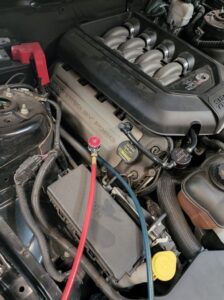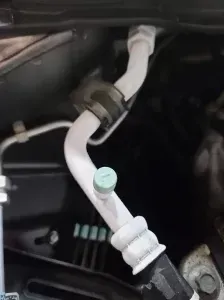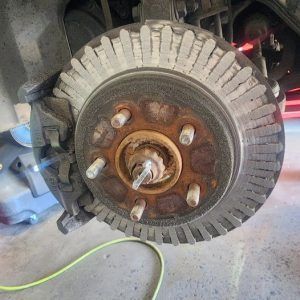Expansion Valve In Car AC: Everything You Need To Know
If you want to stay cool and comfortable while driving, it’s crucial to understand the inner workings of your car’s air conditioning (AC) system. One vital component that plays a crucial role in keeping you cool is the expansion valve. This article will provide you with everything you need to know about the expansion valve in your car’s AC system.
The expansion valve is responsible for regulating the flow of refrigerant into the evaporator coil. As the refrigerant passes through the expansion valve, it undergoes a pressure drop, which causes it to expand and cool down. This chilled refrigerant then absorbs heat from the surrounding air, allowing the AC system to blow out cold air.
Knowing the importance of the expansion valve is essential for troubleshooting AC problems. A faulty expansion valve can lead to issues like insufficient cooling or a complete lack of cold air. Fortunately, fixing a faulty expansion valve is relatively straightforward and can save you money on costly repairs.
To ensure the longevity and efficiency of your AC system, proper maintenance and care of the expansion valve are crucial. Regular inspections and cleaning can prevent clogs and other issues that may arise over time.
In summary, understanding the function, importance, signs of malfunction, and maintenance of the expansion valve in your car’s AC system is key to ensuring a comfortable and enjoyable driving experience.
Let’s dive deeper into the world of the expansion valve and empower you with the knowledge to keep your car’s AC system running smoothly.
Key Takeaways
– The expansion valve is a vital component of the car’s AC system.
– A faulty expansion valve can cause insufficient cooling or a lack of cold air.
– Regular maintenance and care are important for the longevity and efficiency of the AC system.
– Troubleshooting involves checking for clogs or blockages and examining performance with pressure gauges.
Understanding the Function of the Expansion Valve
Do you know how the expansion valve in your car’s AC system works to regulate the flow of refrigerant and keep you cool on those hot summer days? The expansion valve is a crucial component of the AC system, responsible for controlling the amount of refrigerant that enters the evaporator.
This valve works in conjunction with the compressor, condenser, and evaporator to maintain the desired temperature inside your car.
The expansion valve operates on a simple principle known as the pressure-temperature relationship. As the high-pressure refrigerant enters the expansion valve, it passes through a small orifice, causing a sudden drop in pressure. This drop in pressure results in a decrease in temperature, causing the refrigerant to evaporate rapidly.
By controlling the flow of refrigerant, the expansion valve ensures that the evaporator maintains the correct temperature and prevents the system from freezing up.
If you’re experiencing issues with your car’s AC system, such as inadequate cooling or freezing up, it could be due to a faulty expansion valve. Expansion valve troubleshooting involves checking for clogs or blockages in the valve, as well as examining the valve’s performance using pressure gauges. If necessary, expansion valve replacement may be required to restore proper functioning.
Understanding the function of the expansion valve is essential to grasp the importance of this component in the AC system. This valve plays a vital role in regulating the flow of refrigerant, ensuring efficient cooling, and preventing system malfunctions.
Importance of the Expansion Valve in the AC System
The expansion valve plays a crucial role in cooling down the air before it enters the cabin, creating a comfortable and refreshing environment inside the vehicle. It is responsible for regulating the flow of refrigerant into the evaporator, where it undergoes a phase change from a high-pressure liquid to a low-pressure gas. This process is essential for the cooling process to occur effectively.
The role of the expansion valve in the cooling process can be summarized in the following bullet points:
– The expansion valve controls the flow of high-pressure liquid refrigerant into the evaporator.
– It creates a pressure drop, allowing the refrigerant to rapidly expand and evaporate.
– This expansion absorbs heat from the surrounding air, cooling it down.
– The cooled air is then blown into the cabin, creating a comfortable temperature for the occupants.
The importance of a properly functioning expansion valve cannot be overstated. If the expansion valve is malfunctioning, it can lead to several issues, including inefficient cooling, reduced airflow, and increased strain on the AC system. These problems can result in discomfort for the passengers and potential damage to other components of the AC system.
Understanding the signs of a faulty expansion valve is crucial in maintaining the performance of your car’s AC system.
Signs of a Faulty Expansion Valve
When your vehicle’s cooling system isn’t keeping you as comfortable as you’d like, it might be time to check for some telltale signs of a faulty expansion valve. The expansion valve plays a crucial role in regulating the flow of refrigerant in your car’s AC system. If it malfunctions, it can disrupt the cooling process and lead to discomfort in the cabin.
There are several common causes of a faulty expansion valve. One possibility is a clog or blockage in the valve, which can restrict the flow of refrigerant. Another potential cause is a malfunctioning sensor that fails to properly regulate the valve’s opening and closing. Additionally, wear and tear over time can cause the valve to become stuck or damaged, leading to improper functioning.
To troubleshoot a faulty expansion valve, start by checking the temperature of the air coming out of the AC vents. If it’s inconsistent or not as cool as it should be, this could indicate a problem. Another sign to look out for is a sudden increase in pressure on the low side of the AC system. This can be measured using a pressure gauge.
Now that you know the signs of a faulty expansion valve, it’s time to learn how to fix it. Stay tuned for the next section, where we’ll discuss the steps to take in order to address this issue and get your AC system back up and running smoothly again.
How to Fix a Faulty Expansion Valve
Ready to get your vehicle’s cooling system back in top shape? Let’s dive into the steps for fixing a faulty expansion valve!
The expansion valve plays a crucial role in regulating the flow of refrigerant in your car’s AC system. However, it’s not uncommon for the valve to encounter issues over time.
One common problem is a clogged valve, which can restrict the flow of refrigerant and cause poor cooling performance. To troubleshoot this issue, start by inspecting the valve for any visible debris or blockages. If you spot any, carefully clean the valve using a mild solvent and a soft brush.
Another common problem is a faulty valve that fails to open or close properly. In this case, the valve may need to be replaced. Consult your vehicle’s manual or seek professional help to determine the specific valve replacement procedure for your car model.
By addressing these common expansion valve issues, you can ensure optimal cooling performance in your vehicle.
Moving forward, let’s explore some essential maintenance and care tips for keeping your expansion valve in excellent condition.
Maintaining and Caring for the Expansion Valve
To keep your expansion valve in top shape, it’s important to regularly maintain and care for it. Here’s a step-by-step cleaning procedure that will help ensure the longevity and efficiency of your expansion valve:
1. Start by turning off the car’s engine and disconnecting the battery to ensure safety during the cleaning process.
2. Locate the expansion valve, which is usually found near the evaporator coil in the car’s AC system.
3. Use a soft brush or compressed air to remove any dust, debris, or dirt that may have accumulated on the surface of the expansion valve. Be careful not to damage any delicate components while cleaning.
4. Inspect the valve for any signs of corrosion, leaks, or blockages. If you notice any issues, it’s crucial to address them promptly to prevent further damage to the AC system.
Common issues that may arise with the expansion valve include clogging due to debris accumulation or refrigerant leaks caused by corrosion. Regular cleaning and inspection can help identify and resolve these problems before they become major issues.
By following this cleaning procedure and addressing common issues, you can ensure that your expansion valve continues to function optimally, keeping your car’s AC system cool and comfortable even during the hottest days.
Frequently Asked Questions
What are the common causes of a faulty expansion valve in a car AC system?
The common causes of a faulty expansion valve in a car AC system include refrigerant leaks, clogs or restrictions in the valve, and mechanical failures. Symptoms may include poor cooling performance, inconsistent temperature control, and excessive pressure in the AC system.
Can a faulty expansion valve affect the overall cooling performance of the car AC system?
A faulty expansion valve can significantly impact the cooling performance of your car’s AC system. Signs of a faulty expansion valve include insufficient cooling, fluctuating temperature, and poor airflow.
Is it possible to clean and repair a faulty expansion valve, or does it need to be replaced?
To clean a faulty expansion valve, you can use appropriate cleaning solutions and tools. However, it is often more effective to replace the valve as cleaning may not completely solve the problem.
How long does an expansion valve typically last before it needs to be replaced?
Expansion valves typically last between 5 to 10 years before needing replacement. Signs of a failing expansion valve include reduced cooling performance, inconsistent temperature control, and hissing or bubbling noises from the AC system.
Are there any specific maintenance tasks or precautions to take to prevent the expansion valve from becoming faulty?
To prevent expansion valve faults, follow these maintenance tips: regularly clean and inspect the valve, ensure proper refrigerant levels, check for leaks in the system, and replace any damaged or worn-out components. Take expansion valve care precautions to maintain optimal AC performance.
Conclusion
In conclusion, the expansion valve in your car’s AC system plays a crucial role in regulating the flow of refrigerant and maintaining optimum cooling performance. It’s important to be aware of the signs of a faulty expansion valve, such as inadequate cooling or unusual noises.
If you encounter any issues, it’s recommended to consult a professional who can properly diagnose and fix the problem. Regular maintenance and care of the expansion valve is essential for ensuring the longevity and efficiency of your car’s AC system.







